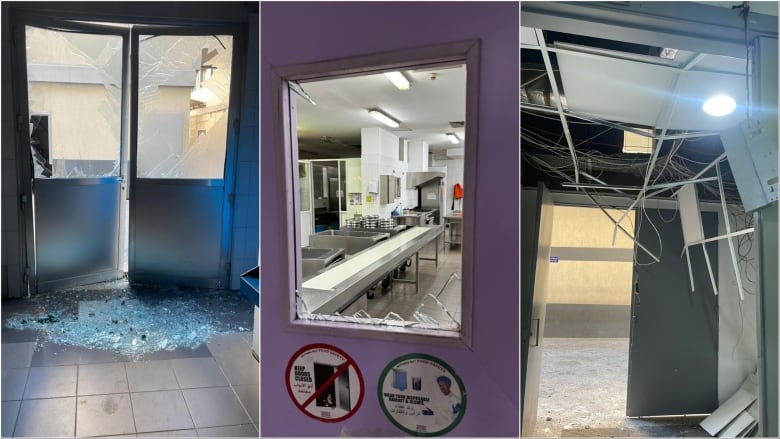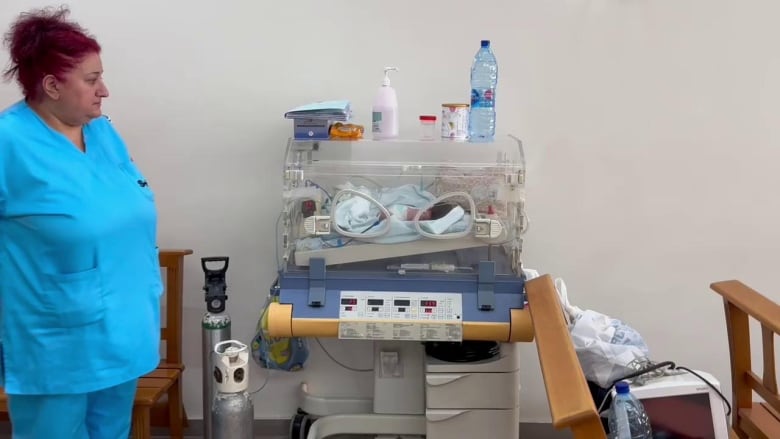
A last-minute decision by Elie Hachem may have saved the lives of his hospital’s patients and staff.
Hachem is the director of the Sainte Therese Hospital in Beirut. In the early morning hours of Oct. 3, he got a call from his head nurse with urgent news.
The Israeli Defence Force had posted a warning on social media. They were about to bomb a target 100 metres away, putting the hospital in the evacuation zone.
“We had a hospital full of patients, so we can’t evacuate,” Hachem told As It Happens host Nil Köksal.
The protocol for a situation like this, he says, is to move everyone to the emergency room. But looking at a map, he realized the ER was facing the direction of the pending strike. So he told the nurse to instead move everyone to the hospital’s admissions area.
“Thankfully, it was the right decision, because the ER was completely destroyed and the admissions office was safe,” he said. “We had zero injuries.”
Not everyone has been so lucky.
As Israel continues its offensive in Lebanon, the World Health Organization says health-care workers are under enormous strain, taking on unprecedented numbers of injured people, while sometimes coming under fire themselves.
The United Nations agency says it has verified 23 attacks on health-care facilities and transportation in Lebanon since Sept. 17, leading to 72 deaths and 43 injuries among health workers and patients.

No hospitals have been directly hit, but at least five have been evacuated, and another five partially evacuated, said WHO.
“The situation in Lebanon is alarming. Attacks on health care debilitate health systems and impede their ability to continue to perform,” Dr. Hanan Balkhy, WHO regional director for the Eastern Mediterranean, said in a statement.
“They also prevent entire communities from accessing health services when they need them the most.”
Israel says its strikes are targeting Hezbollah
The IDF says its offensive in Lebanon is targeting the militant group Hezbollah, which has been firing rockets into Israel throughout the course of the Israel-Hamas war.
“Health organizations in Lebanon are obviously very important for the civilians and the strain during a war. But it should be very clear that we’re operating against the world’s largest terrorist organization who embed themselves in civilian areas,” an IDF spokesperson told CBC on Wednesday.
“The IDF makes great efforts to warn civilians, as was done [in the Oct. 3 strike], to mitigate any harm to civilians.”
Israel has also said Hamas operates out of civilian infrastructure in Gaza where, according to the United Nations, only 17 of 36 hospitals remain partly operational.

Hachem called on the international community to demand protection not only for hospitals, but also their immediate vicinities.
By the time they saw the IDF warning, Sainte Therese Hospital staff had just 20 minutes to move dozens of patients, including three premature babies in incubators. They just made out of harm’s way it in the nick of time, he said.
He says the hospital took on “massive damage,” including broken windows, crumbled ceilings, and burst pipes that caused flooding and damaged electrical equipment.
But two weeks later, they’re up and running at full capacity.
“I had my team working 24/7 ever since the strike, because we can’t stop,” he said. “We have people counting on us. We have a whole community that needs us, especially in these hard times.”
Israel, Hezbollah dig in heels
A year of low-level fighting along the Israel-Lebanon border escalated into all-out war last month, and Israel invaded Lebanon at the start of October.
Some 2,300 people have been killed by Israeli strikes in Lebanon since last October, more than three-quarters of them in the past month, according to Lebanon’s Health Ministry, which did not distinguish between civilians and fighters. The fighting has displaced some 1.2 million people in Lebanon.
Hezbollah’s rocket attacks, which have extended their range and grown more intense over the past month, have driven around 60,000 Israelis from their homes in the north. The attacks have killed nearly 60 people in Israel, around half of them soldiers, according to Israeli officials.
Israeli Defence Minister Yoav Gallant says his country will continue its offensive in Lebanon until its citizens can safely return to communities near the border, while Hezbollah deputy leader Naim Qassem has said the militant group will keep up its attacks until there is a ceasefire in Gaza.
WHO says the war has left Lebanon’s remaining hospitals overwhelmed with casualties and patients who have been evacuated from other facilities.
To help meet the need, the International Committee of the Red Cross (ICRC) has deployed a team of surgeons to treat war-related wounds at the government-run Rafik Hariri University Hospital in Beirut, which is taking in patients from evacuated hospitals.
“The fact that we do not know how this conflict is going to evolve and what is going to happen for us is very trying,” Simone Casabianca-Aeschlimann, head of the ICRC in Lebanon, said.
Hachem says his hospital is mostly treating regular patients now, as the conflict has moved to other parts of the region.
Some of his staff been displaced by airstrikes, he says, and many are now living inside the hospital.
“The staff are all traumatized,” he said. “They still want to work. They want to help our community. But, yeah, it is very hard.”
He, too, is feeling the pressure.
“I have to keep on smiling. I can keep on giving my staff morale, telling them they’re doing a good job,” he said. “I try to look as good as I can psychologically in front of them. But it has been tiring.”